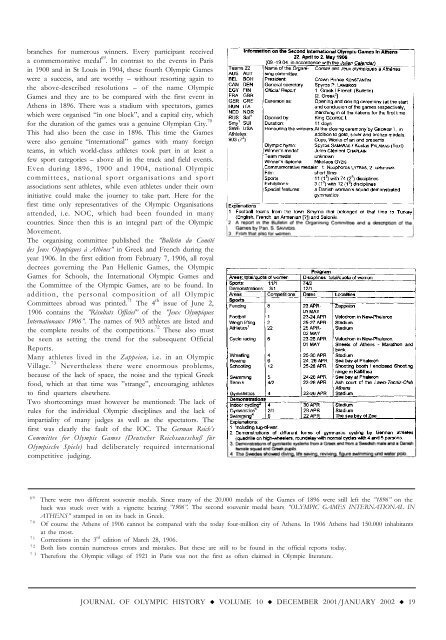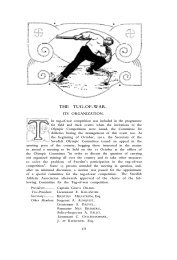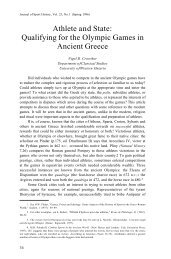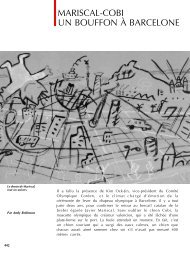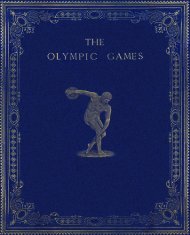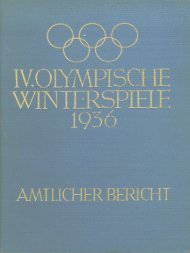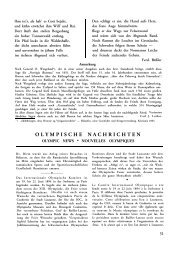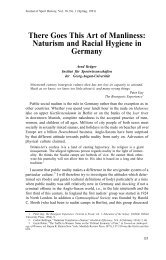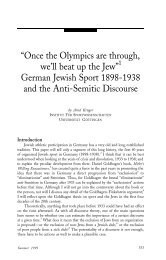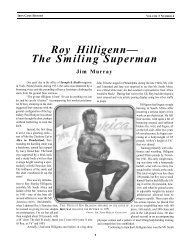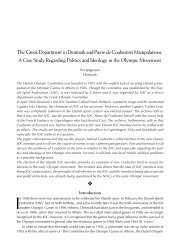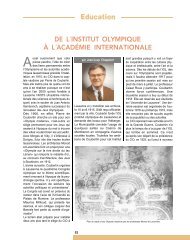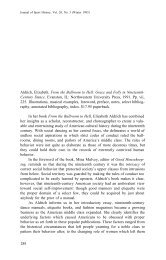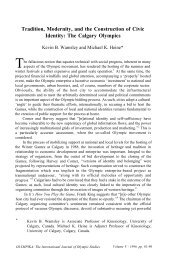The 2nd International Olympic Games in Athens 1906.
The 2nd International Olympic Games in Athens 1906.
The 2nd International Olympic Games in Athens 1906.
Create successful ePaper yourself
Turn your PDF publications into a flip-book with our unique Google optimized e-Paper software.
anches for numerous w<strong>in</strong>ners. Every participant received<br />
a commemorative medal 69 . In contrast to the events <strong>in</strong> Paris<br />
<strong>in</strong> 1900 and <strong>in</strong> St Louis <strong>in</strong> 1904, these fourth <strong>Olympic</strong> <strong>Games</strong><br />
were a success, and are worthy – without resort<strong>in</strong>g aga<strong>in</strong> to<br />
the above-described resolutions – of the name <strong>Olympic</strong><br />
<strong>Games</strong> and they are to be compared with the first event <strong>in</strong><br />
<strong>Athens</strong> <strong>in</strong> 1896. <strong>The</strong>re was a stadium with spectators, games<br />
which were organised “<strong>in</strong> one block”, and a capital city, which<br />
for the duration of the games was a genu<strong>in</strong>e Olympian City. 70<br />
This had also been the case <strong>in</strong> 1896. This time the <strong>Games</strong><br />
were also genu<strong>in</strong>e “<strong>in</strong>ternational” games with many foreign<br />
teams, <strong>in</strong> which world-class athletes took part <strong>in</strong> at least a<br />
few sport categories – above all <strong>in</strong> the track and field events.<br />
Even dur<strong>in</strong>g 1896, 1900 and 1904, national <strong>Olympic</strong><br />
committees, national sport organisations and sport<br />
associations sent athletes, while even athletes under their own<br />
<strong>in</strong>itiative could make the journey to take part. Here for the<br />
first time only representatives of the <strong>Olympic</strong> Organisations<br />
attended, i.e. NOC, which had been founded <strong>in</strong> many<br />
countries. S<strong>in</strong>ce then this is an <strong>in</strong>tegral part of the <strong>Olympic</strong><br />
Movement.<br />
<strong>The</strong> organis<strong>in</strong>g committee published the ”Bullet<strong>in</strong> du Comité<br />
des Jeux Olympiques à Athènes” <strong>in</strong> Greek and French dur<strong>in</strong>g the<br />
year <strong>1906.</strong> In the first edition from February 7, 1906, all royal<br />
decrees govern<strong>in</strong>g the Pan Hellenic <strong>Games</strong>, the <strong>Olympic</strong><br />
<strong>Games</strong> for Schools, the <strong>International</strong> <strong>Olympic</strong> <strong>Games</strong> and<br />
the Committee of the <strong>Olympic</strong> <strong>Games</strong>, are to be found. In<br />
addition, the personal composition of all <strong>Olympic</strong><br />
Committees abroad was pr<strong>in</strong>ted. 71 <strong>The</strong> 4 th issue of June 2,<br />
1906 conta<strong>in</strong>s the ”Résultats Officiel” of the ”Jeux Olympiques<br />
Internationaux 1906”. <strong>The</strong> names of 903 athletes are listed and<br />
the complete results of the competitions. 72 <strong>The</strong>se also must<br />
be seen as sett<strong>in</strong>g the trend for the subsequent Official<br />
Reports.<br />
Many athletes lived <strong>in</strong> the Zappeion, i.e. <strong>in</strong> an <strong>Olympic</strong><br />
Village. 73 Nevertheless there were enormous problems,<br />
because of the lack of space, the noise and the typical Greek<br />
food, which at that time was ”strange”, encourag<strong>in</strong>g athletes<br />
to f<strong>in</strong>d quarters elsewhere.<br />
Two shortcom<strong>in</strong>gs must however be mentioned: <strong>The</strong> lack of<br />
rules for the <strong>in</strong>dividual <strong>Olympic</strong> discipl<strong>in</strong>es and the lack of<br />
impartiality of many judges as well as the spectators. <strong>The</strong><br />
first was clearly the fault of the IOC. <strong>The</strong> German Reich’s<br />
Committee for <strong>Olympic</strong> <strong>Games</strong> (Deutscher Reichsausschuß für<br />
Olympische Spiele) had deliberately required <strong>in</strong>ternational<br />
competitive judg<strong>in</strong>g.<br />
69<br />
<strong>The</strong>re were two different souvenir medals. S<strong>in</strong>ce many of the 20.000 medals of the <strong>Games</strong> of 1896 were still left the ”1896” on the<br />
hack was stuck over with a vignette bear<strong>in</strong>g ”1906”. <strong>The</strong> second souvenir medal bears ”OLYMPIC GAMES INTERNATIONAL IN<br />
ATHENS” stamped <strong>in</strong> on its back <strong>in</strong> Greek.<br />
70<br />
Of course the <strong>Athens</strong> of 1906 cannot be compared with the today four-million city of <strong>Athens</strong>. In 1906 <strong>Athens</strong> had 150.000 <strong>in</strong>habitants<br />
at the most.<br />
71<br />
Corrections <strong>in</strong> the 3 rd edition of March 28, <strong>1906.</strong><br />
72<br />
Both lists conta<strong>in</strong> numerous errors and mistakes. But these are still to be found <strong>in</strong> the official reports today.<br />
73<br />
<strong>The</strong>refore the <strong>Olympic</strong> village of 1921 <strong>in</strong> Paris was not the first as often claimed <strong>in</strong> <strong>Olympic</strong> literature.<br />
JOURNAL OF OLYMPIC HISTORY ◆ VOLUME 10 ◆ DECEMBER 2001/JANUARY 2002 ◆ 19


